
German postcard by Ross Verlag, no. 915/1, 1925-1926. Photo: Zelnik-Mara-Film / Distr. Phoebus. Alphons Fryland in Auf Befehl der Pompadour/By order of De Pompadour (Friedrich Zelnik a.k.a. Frederic Zelnik, 1924).

German postcard by Ross Verlag, no. 1071/1, 1927-1928. Photo: Karl Luther / Davidsohn-Film. Fryland acted in three of the four films produced by Paul Davidson's film company Davidsohn-Film: Ich liebe dich/I Love You (Paul L. Stein, 1925), Die Insel der Träume/Isle of Dreams (Paul L. Stein, 1925) and Liebesfeuer/Fires of Love (Paul L. Stein, 1925). This card shows him as the Duke of Arenheim in Liebesfeuer/Fires of Love (Paul L. Stein, 1925).
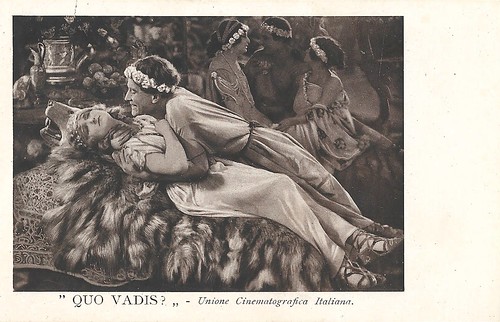
Italian postcard by Ed. L'Argentografica, Turin, no. 3055. Photo: Unione Cinematografia Italiana (UCI). Alphons Fryland as Vinicius and Lilian Hall-Davis as Licia/Lygia at Nero's banquet from Quo vadis? (Gabriellino D'Annunzio, Georg Jacoby, 1924), based on the classic novel by Henryk Sienkiewicz.
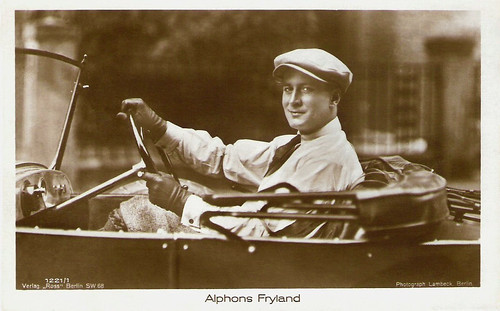
German postcard by Ross Verlag, Berlin, no. 1221/1, 1927-1928. Photo: Lambeck, Berlin.
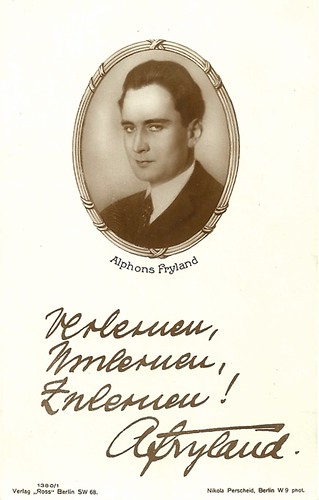
German postcard by Verlag Ross, Berlin, no. 1380/1, 1927-1928. Photo: Nicola Perscheid. Caption: Verlernen, Umlernen, Zulernen! (Unlearning, Remodelling, Relearning!)
Comet-like career
Alphons (or Alfons) Fryland was born as Alphons Fritsch in Vienna, Austria-Hungary (now Austria), in 1888.
He attended the Exportakademie Wien. From 1914 on he studied music in Graz, München and Paris. He then followed acting classes from Karl Peppler, but during World War I he had to serve in the army.
In 1919, he was engaged by director Fritz Freisler as the leading actor in the film Jagd nach dem Glück/Hunt For Happiness (Fritz Freisler, 1920), produced by Sascha-Film.
He then made a comet-like career in the Austrian and German cinema. In 1921 Fryland starred in four films opposite Hungarian star Lucy Doraine.
All four were directed by Doraine's husband Mihály Kertész later better known as Michael Curtiz: Labyrinth des Grauens/Labyrinth of Horror (1921) in which he played a serial killer, Frau Dorothys Bekenntnis/Mrs. Dane's Confession (1921), Herzogin Satanella/Good and Evil (1921) and Mrs. Tutti Frutti (1921).
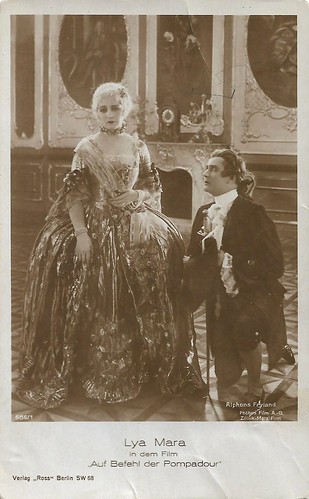
German postcard by Ross Verlag, no. 586/1, 1919-1924. Photo: Zelnik-Mara-Film / Distr. Phoebus. Lya Mara and Alphons Fryland in Auf Befehl der Pompadour/By order of De Pompadour (Friedrich Zelnik a.k.a. Frederic Zelnik, 1924).
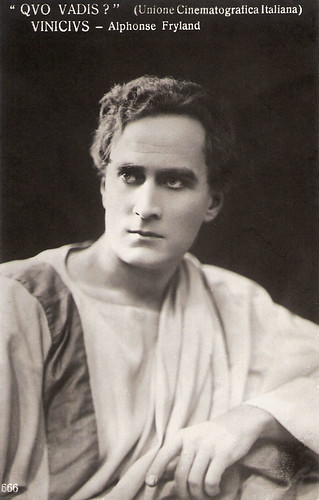
Italian postcard by Ed. Romeo Biagi, Bologna, no. 666. Photo: Unione Cinematografica Italiana. Publicity still for Quo vadis? (Gabriellino D'Annunzio, Georg Jacoby, 1925).
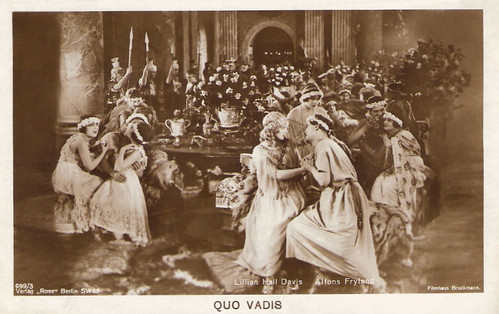
German postcard by Ross Verlag, no. 699/3, 1919-1924. Photo: Filmhaus Bruckmann. Alphons Fryland and Lilian Hall-Davis in Quo vadis? (Gabriellino D'Annunzio, Georg Jacoby, 1925).

Yugoslavian Postcard by Ed. Caklovic, Zagreb, no. 103. Photo: Pan Film, Zagreb / Maxim-Film. Lee Parry and Alphons Fryland in Fedora (Jean Manoussi, 1926).
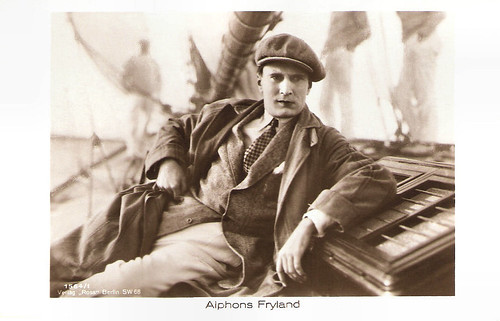
German postcard by Ross Verlag, Berlin, no. 1564/1, 1927-1928.
Super production
Alphons Fryland played leading and supporting roles in many German and Austrian films of the 1920s and he became quite popular. His co-star in these silent films was often Liane Haid in such films as the blockbuster Lucrezia Borgia/Lucretia Borgia (Richard Oswald, 1922), and Ich liebe dich/I Love You (Paul L. Stein, 1925). Among his other popular films were Kean (Rudolf Biebrach, 1921) starring Alexander Moissi, Zwischen Abend und Morgen/Between Evening and Morning (Arthur Robison, 1923) with Werner Krauss, and Arabella (Karl Grune, 1924) with Mae Marsh.
A super production was the German-Italian epic Quo Vadis? (Gabriellino D'Annunzio, Georg Jacoby, 1925) based on the novel by Nobel prize winner Henryk Sienkiewicz. Fryland played the rather fey hero Vinicius, and he was completely overwhelmed by the other star, the great Emil Jannings as the infamous emperor Nero.
Another big production was Das schicksal derer von Habsburg/The Destiny of the Habsburgs (1928) a dramatic account of the Austrian royal family at the turn of the 20th century. Fryland starred as Sissi's son, Crown Prince Rudolf who committed suicide together with his young - and pregnant - mistress, the beautiful baroness Marie Vetsera. He was surrounded by an all-star cast including Erna Morena as Empress Sissi, Maly Delschaft as Rudolph's wife, Belgium's Princess Stéphanie and Leni Riefenstahl as Vetsera.
Towards the end of the 1920s, his career slowly went into decline. The sound film revolution finished his career. He appeared only in a few sound films: the mountain drama Der Bergführer von Zakopane/The Mountain Guide of Zakopane (Domenico Gambino, Adolf Trotz, 1931), and Die Nacht der Entscheidung/The Night of the Decision (Dimitri Buchowetzki, 1931) with Conrad Veidt.
In 1932 he became a NSDAP party member, and he claimed to be discriminated for film parts by the Jewish producer Alfred Zeisler. It didn't help to further his career. He made one last film, Johannisnacht/Midsummer Night (Willy Reiber, 1933) starring Lil Dagover. After these uninteresting roles, he retired and returned to Graz. There he called himself Alphons Fritsch again. He worked as a consultant at the administrative district office. Forgotten, Alphons Fryland died in Graz, Austria in 1953, aged 65.
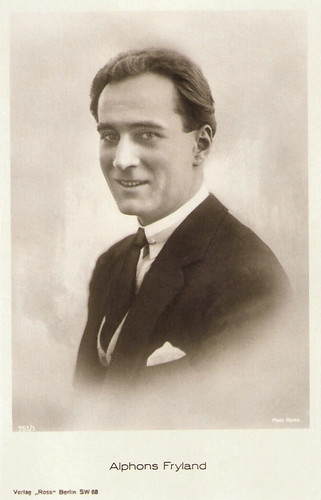
German postcard by Ross Verlag, no. 751/1, 1925-1926. Photo: Pinto, Roma.

German postcard by Ross Verlag, no. 751/2, 1925-1926. Photo by Pinto, Roma. These photo must have been taken during Fryland's stay in Rome for the shooting of Quo vadis? (Gabriellino D'Annunzio, Georg Jacoby, 1925).

German postcard by Ross Verlag, no. 970/1, 1925-1926. Photo: Davidsohn Film. Fryland acted in three of the four films produced by Paul Davidson's film company Davidsohn-Film: Ich liebe dich/I Love You (Paul L. Stein, 1925), Die Insel der Träume/Isle of Dreams (Paul L. Stein, 1925) and Liebesfeuer/Fires of Love (Paul L. Stein, 1925).
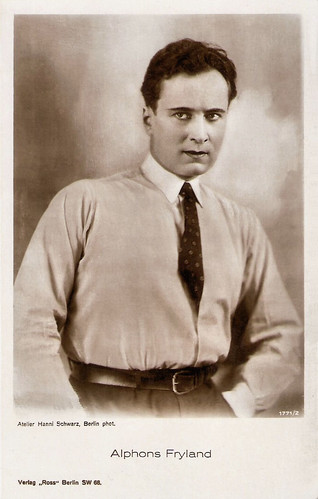
German postcard by Ross Verlag, no. 1771/2, 1927-1928. Photo: Atelier Hanni Schwarz, Berlin.
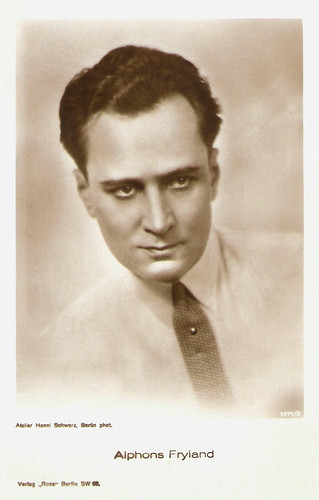
German postcard by Ross Verlag, no. 1771/3, 1927-1928. Photo: Atelier Hanni Schwarz, Berlin.

German postcard by Ross Verlag, no. 4223/1, 1929-30. Photo: Atelier Hanni Schwarz.
Sources: Thomas Staedeli (Cyranos - German), Philippe Pelletier (CinéArtistes - French), Nicole Gagne (AllMovie), Wikipedia, and IMDb.
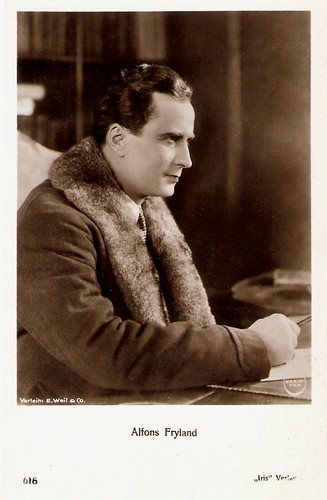
Austrian postcard by Iris-Verlag, no. 616. Photo: Verleih B. Weil & Co.
This post was last updated on 21 April 2024.
No comments:
Post a Comment